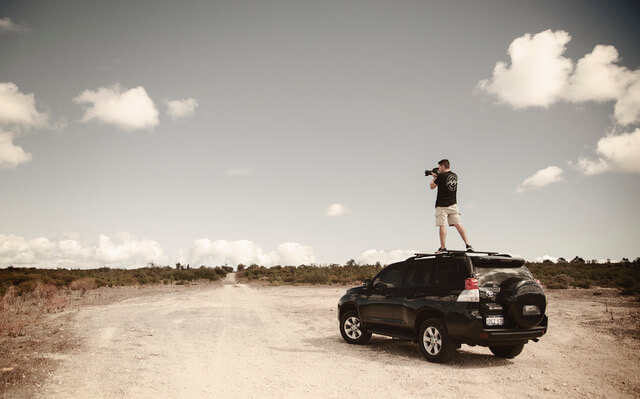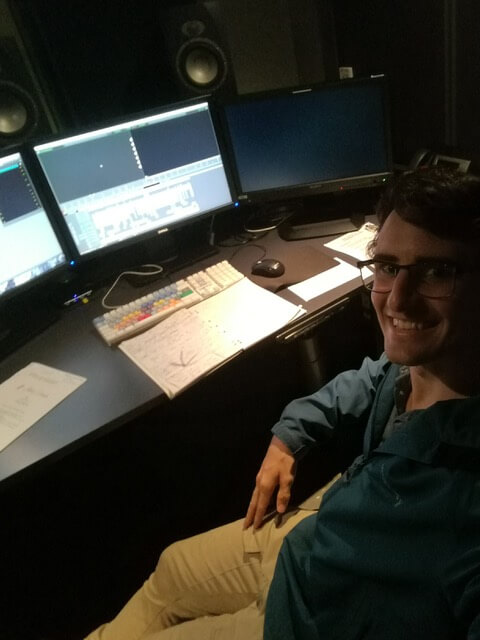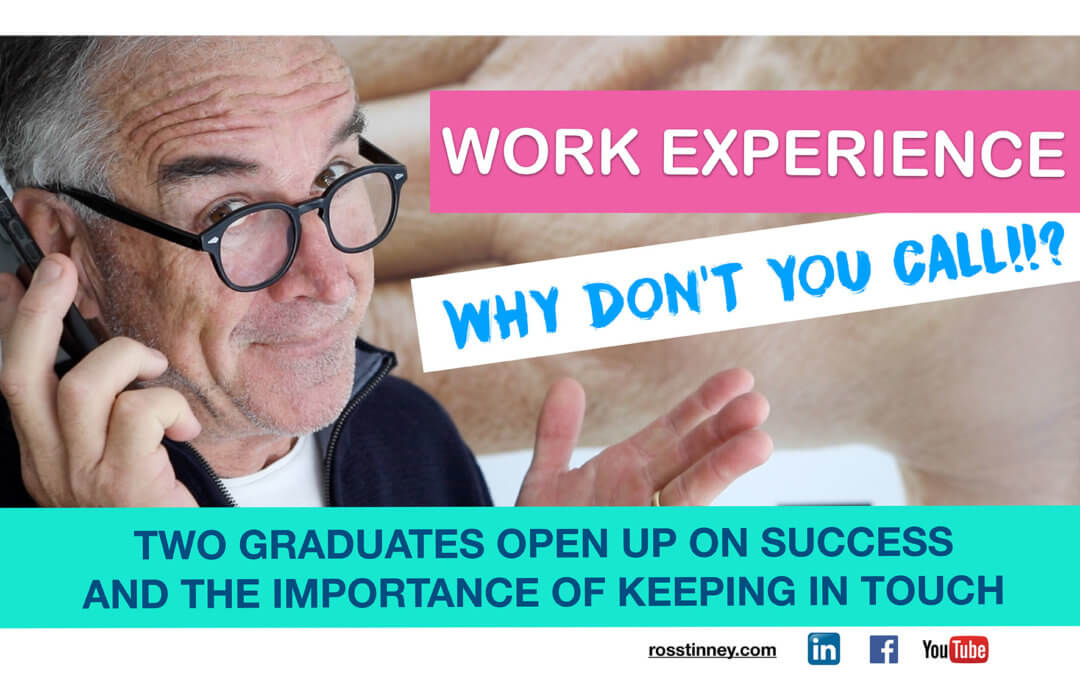(2628 words – 7min read) The whole concept of students gaining work experience, developing their professional network and connecting with the industry of their choice has been a constant frustration for me.
It’s such a simple action; pick up phone, call company, ask for Mr. or Ms. Relevant, discuss work experience opportunities. OR write email, hit send. Repeat hundreds of times until successful.
I know, I know there’s a few elements missing is this process. Like finding the name of Mr. or Ms Relevant in the first place, where they work, their phone number. But holy shit, that’s the easy part!! More on that later.
But first….
Two graduates open up on their success and the importance of keeping in touch to gain invaluable work experience.
You may recall a story I related a while back, of me lecturing to 28-Second Year Film & TV students and asking them how many had been out on a film set. One person put their hand up.
Strange, I thought. That’s not a lot.
So I said, ‘Here, I have 28 business cards, please take one’. They were gone in a nano second.
I continued….’I’m a busy director making TV commercials, documentaries, online content. If you would like to get on-set work experience, call me and I’ll make it happen’.
How many students called me? Two.
One of them was Shaun Atherstone, one of the graduates I interviewed for this post.

What better person to ask! Tell us about yourself, Shaun.
Shaun: I studied film and TV at Central TAFE Perth WA. After graduating with a diploma I decided to go in a different direction – I focused more on Stills photography and spent the next few years learning and experimenting. I somehow landed a contract at The Herdsman Inspiring Food, doing all their product photography and later landing a full-time job within their marketing team where I had the opportunity to learn a bit about the world of advertising. After being made redundant in 2013, I was back at ground zero. So I printed dozens of portfolios and went door knocking. Fortunately, out of the 30 or so advertising agencies I introduced myself to, one agency called me back. They needed some headshot photos done, so I jumped at the opportunity. Since then I’ve been fortunate enough to have built a strong relationship with them, and have shot a number of TVC’s and photographed numerous stills campaigns for some of their biggest national brands. I now have a handful of bigger clients and agencies which I have also built strong relationships with and for whom I do regular campaign work – from stills, and motion, to post production work.
Shaun said. ‘I somehow landed a contract’. You don’t somehow land a contract…without effort. I asked how that really happened.
Shaun: Well, my mom was friends with a lady who knew the marketing manager at the Herdsman, and apparently she was looking for someone to take photographs of a few products. So I got in touch with her and she gave me the opportunity to come in and take the photos she was after (Keep in mind I knew nothing about food photography) . The initial shoot went so well that she asked if I could come back the following week and from there we built a really great working relationship. A couple of months later I was their offical product photographer, taking photos every week of new and existing products.
Another student is Timothy Hadwen.
I asked Tim about himself, where he studied, worked, to where he is today…
I first studied at the University of Notre Dame (Fremantle), where I completed a Bachelor of Communications and Media. After completing this degree, I went to Sydney for a postgraduate in editing at the Australian Film, TV and Radio School. Thanks to a great network over in Perth and some friendly people in Sydney I secured a job as an assembly editor at the Seven Network. Since then I’ve worked in a range of broadcast television post-production roles as well as short films and documentaries that have screened at film festivals in Australia and overseas. As of time of writing, I am currently employed at Warner Brothers International Television Production Australia.
The importance of work experience
I wanted to know more…
How important was work experience to you, when you were a student?
Shaun: Work experience was very important. I learnt more on a handful of TVC productions than I did in 2 years at TAFE. It also gave me the opportunity to meet people within the industry which to this day has been extremely useful.
Tim: Work experience was a crucial addition to my studies. It was important for me (and still is) to see how different workplaces deal with a wide variety of problems and creative tasks. It was also a way for me to grow my network. Often you learn something important without realising it at the time.
Be proactive and engage in networking events
And what initiatives did you put in place to gain work experience?
Tim: Sending emails and making phone calls was always the most important part of the process. I did not wait for the opportunities to come to me. In my opinion, if you are not communicating to others they will never find you and give you the opportunity you are looking for. Colleagues of mine would often wait for the phone to ring – which would never happen. Attending networking events was an important part of my process as well. Consistent attendance at networking events was crucial.
Shaun: I tried to take advantage of every situation I was in, and in this case it was phoning people I met on shoots, or lectures and asking them if I could show them my portfolio or lend a hand on any upcoming shoots.
Don’t be discouraged by knock backs – they are normal and part of your growth
Did you get knock backs when you were looking for work experience and if so, how did you cope with that?
Tim: In looking for paid employment and in work experience there are always knock backs. It’s important not to take it too personally as often it is due to timing or other factors outside of your control (such as paperwork legalities or timing). Most importantly, don’t give up on your aspirations. Coping with setbacks and knock backs is an individual and personal process – my best advice is to either initiate communication with them in future or look at other ways you can learn including short courses.
Shaun: To be honest I feel I was never knocked back when reaching out. At worst, the answer was ‘Sorry mate there’s no work on at the moment but keep phoning’. So I did and eventually the opportunities would arise and I would be on set helping out and learning.
These are both great stories, and they both evolved from one thing….self motivation. Both Tim and Shaun had set backs, they climbed countless mountains, Shaun was even made redundant. But he never gave in. He got off his arse, made up heaps of portfolios and went knocking on doors and kept on his networking.
But that’s only part of being the successful graduate. The other part is making sure you MAINTAIN THE CONNECTION.
Learning to maintain the connection is paramount
And here is my biggest disappointment.
I had a film student who rang me some months ago, seeking work experience. She was a friend of a friend but that doesn’t give her an advantage, no.
She still had to MAINTAIN THE CONNECTION.
Well, she did, sort of.
She kept in touch, we met up. Her passion was post production but she’d learnt how to shoot with a DSLR camera. So I got her on a big TV commercial shoot. Her job? To shoot the shoot, with the view she would edit said footage into a behind-the-scenes video. Great for me, great for her showreel. Win Win.
For nearly two months after the shoot I never heard from her.
Then I was out to breakfast the other day with her friends (her network connection to me). I mentioned I hadn’t heard anything. Next day I get a text from our work experience girl. Not a call, a text, to say she’d decided that production make-up was her passion. Ok, great. I really do wish her well. But a call earlier would have been better for both parties. I could even have connected her with make-up people I know.
So I now have a bin of wild behind-the-scenes footage, if anyone is interested in editing. 🙂
I have so many students that failed to MAINTAIN THE CONNECTION. They’d make the initial contact, the beginning of networking (so the hard work had been done). We would have a chat, I’d tell them either I have a job, OR ‘politely’, ‘encouragingly’, ‘positively’ tell them I have no work on right now BUT there’s work coming up and to call me in a couple of weeks.
75% will disappear forever. Yes, never to be heard from again. Sad.
Have persistence and perseverance
Tim: Persistence and perseverance is fundamental to success in anything. Many people are looking for quick shortcuts to success or easy pathways to accomplishments. I’m not the first to convey this – no achievement worth having comes easy. Experience and trust from others in the industry is built through persistence, perseverance and patience. Repeated actions demonstrate who you are far better than singular events or choices. In short, attending an industry meetup that one time 3 months ago does not demonstrate your enthusiasm. Respect and trust is built through repetition.
Shaun: You could have all the talent in the world but I feel if you don’t have persistence or perseverance you won’t ever be in a position where you can put your talent to use. This is a tough industry to be in, you will climb mountain after mountain and have more ups and downs than a rollercoaster but if you are passionate about your craft, your persistence and perseverance will always pay off.
Work hard and be nice to people
I certainly don’t offer intricate, detailed methods for marketing and self promotion in my blogs and vlogs, merely advice based on one thing…..common sense.
And a powerful comment has inspired me for years, one I got from
Matt Eastwood, ex Perth lad and now Chief Global Creative Officer for McCann Health, based in New York.
‘Work hard and nice to people’. Try it sometime. It works.
How did you meet Ross Tinney and what inspiration, if any, did you glean from him?
Tim: I met Ross Tinney when he spoke to a bunch of students at WAAPA (WA Academy of Performing Arts) . He was giving a presentation which detailed some of his career along with general tips for film and television professionals (including casting). After this event, I purchased his book My P.O.V: Getting Ahead in the Film Industry. His book was practical, thoughtful and well-articulated. I also assisted Ross and his crew on two commercial productions. The most important lessons I learnt from Ross are value-based. Ross has a great way of articulating how simple actions and values make you a great person and a great team member. It’s the simple things – dress well, be a communicator, show up on time. Nobody will continue to employ someone who does not demonstrate respect for others time or workplace standards. Although these seem obvious, Ross gives great examples and anecdotes for how simple mistakes can be made (and how to avoid them).
Ross has a saying, ‘work hard and be nice to people’. How important do you think this is in everyday life?
Tim: “Work hard and be nice to people” is very important. It’s an ethos and mentality that I apply to every job. I have witnessed plenty of situations where producers discuss who to hire – majority of the conversations are based upon whether the potential employee works hard and/or whether they are nice people. University qualifications and awards mean nothing if you are an unkind and inconsiderate person. Outside of the work environment – working hard and being nice to people is a great mentality for overall fitness and relationships.
Plan the work and work the plan
So there is a process here and it is based around this: plan the work and work the plan.
- Decide what you want to be (check my list of 30 production roles if you need some inspiration). Google the companies based on that desire.
- Map out your list of target phone calls or emails. How do you get email addresses?
- Call the company you are targeting, and say you are wishing to send the Creative Director, Producer, MD, CEO an email. They may say, ‘send it to me and I’ll pass it on to the right person’. That’s fine. Get that person’s name. Get the name of the receptionist you are talking to. You have at least started a relationship.
- Once you have your list, it then comes down to your persistence.
- Never, ever give up.
Oh and please never, ever forget that once you have made it, once you are on your way, been awarded an internship or full time job…that you remember those students and graduates coming up behind you, unsure and seeking guidance. Be their mentor, just like those who mentored you. Be their network lifeline.
The importance of giving back
Guys, how important is ‘giving back’ and what initiatives are you engaging in to achieve this?
Shaun: If giving back wasn’t important I wouldn’t have had the opportunities I had to get out there to learn and grow.
I’m a big believer in giving back and passing on what I have learnt, so when the right opportunities present themselves I take on a number of keen Uni and TAFE students who want to get out there and learn.
Tim: Giving back is an important part of the process. I would not be where I am now without the incredible support I have had from those in the industry. I am extremely grateful to have had many industry professionals take time out of their lives to offer advice and help me learn. Giving back is as simple as taking time out to demonstrate a process to an unfamiliar colleague. More recently I have been attending networking events and offering advice to those who are new to the film and television industry in Sydney. As at time of writing, I also intend to travel to Los Angeles to volunteer as a mentor in a youth leadership and goal-setting program. As I learn and discover more, I’m hoping in future I can pass on my knowledge to those who need it most.
Providing work experience is vital to keep the chain moving
But it is Tim’s email that inspired me to interview him for this post.
It ends like this….
‘Although I certainly do back myself in my own endeavours, it is fair to say your wise words did help to guide me way back in 2014 and 2015.
So in short, if you ever feel that you might not have connected with someone, or that an old student you knew has ‘lost touch’ – know that we are out there. We’re just working hard, making a difference, and being nice to people. Only just getting started!
All the best,
Timothy Hadwen
Conclusion
While I reflect on Tim’s words with great pride, it is with greater hope that the graduates and students seeking a career out there are working hard to grow your network and MAINTAIN THE CONNECTION. For without that persistence and perseverance, you will be left languishing in the NEVER QUITE MADE IT bin.
Kind regards,
Ross



